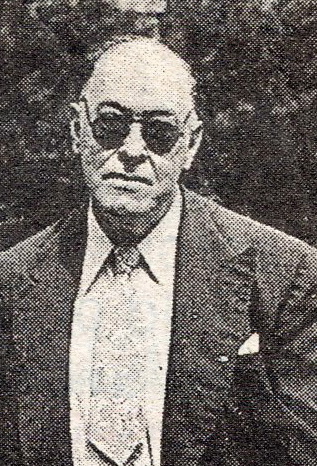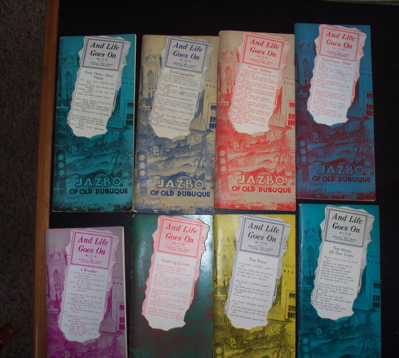Encyclopedia Dubuque
"Encyclopedia Dubuque is the online authority for all things Dubuque, written by the people who know the city best.”
Marshall Cohen—researcher and producer, CNN
Affiliated with the Local History Network of the State Historical Society of Iowa, and the Iowa Museum Association.
MULGREW, John Patrick: Difference between revisions
No edit summary |
No edit summary |
||
| Line 7: | Line 7: | ||
Mulgrew gained national recognition as a scriptwriter for NBC radio's "Uncle Ezra" program heard weekly on the "National Barn Dance Hour." During the height of vaudeville, he moved East and wrote many sketches used by such new talents as Jack Benny and Fred Allen. During the Great Depression, he returned to Dubuque and again roomed above his father's bakery. | Mulgrew gained national recognition as a scriptwriter for NBC radio's "Uncle Ezra" program heard weekly on the "National Barn Dance Hour." During the height of vaudeville, he moved East and wrote many sketches used by such new talents as Jack Benny and Fred Allen. During the Great Depression, he returned to Dubuque and again roomed above his father's bakery. | ||
While living in Dubuque, Mulgrew wrote a column called "And Life Goes On" for the [[WITNESS]]. He was paid two dollars for each week's column which ran in the paper for fourteen years. His verse and wit, despite the masthead which read "America's Most Widely Unknown Columnist" became so popular that it was decided to publish a yearbook containing his best columns. | |||
These yearbooks were sold between 1935 and 1949. Copies were distributed to our troops stationed overseas during [[WORLD WAR II]] as a boost for their morale. Mulgrew's poems also appeared regularly in the London edition of "Stars and Stripes" and were read over the British Broadcasting Company on a serviceman's program. | [[Image:jazboyb.jpg|left|thumb|350px|Yearbooks. Photo courtesy: Bob Reding]]These yearbooks were sold between 1935 and 1949. Copies were distributed to our troops stationed overseas during [[WORLD WAR II]] as a boost for their morale. Mulgrew's poems also appeared regularly in the London edition of "Stars and Stripes" and were read over the British Broadcasting Company on a serviceman's program. | ||
Mulgrew was a man of distinct habits. He picked up his mail at a certain time, stopped at Mrs. Grady's at Third and Main for coffee, visited the book department at [[ROSHEK'S DEPARTMENT STORE]] at about 9:30 a.m. and at about 4:00 p.m. would visit the chapel at [[ST. RAPHAEL'S CATHEDRAL]]. | Mulgrew was a man of distinct habits. He picked up his mail at a certain time, stopped at Mrs. Grady's at Third and Main for coffee, visited the book department at [[ROSHEK'S DEPARTMENT STORE]] at about 9:30 a.m. and at about 4:00 p.m. would visit the chapel at [[ST. RAPHAEL'S CATHEDRAL]]. | ||
[[Image:signature.jpg|right|thumb|200px|Signature of "Jazbo" in one of the yearbooks. Photo courtesy: Bob Reding]] | [[Image:signature.jpg|right|thumb|200px|Signature of "Jazbo" in one of the yearbooks. Photo courtesy: Bob Reding]] | ||
[[Category: Writer]] | [[Category: Writer]] | ||
Revision as of 04:10, 11 January 2011
MULGREW, John Patrick. (Dubuque, IA, Jan. 12, 1886- Dubuque,IA, 1949). Writer. Mulgrew, the son of M. J. and Mary Mulgrew, attended SAINT RAPHAEL'S CATHEDRAL SCHOOL, DUBUQUE HIGH SCHOOL, and LORAS COLLEGE where he graduated in 1907. For many years he lived above the Mulgrew Bakery operated by his father and grandfather at Third and Main.
Mulgrew regularly worked as a reporter and columnist for the TELEGRAPH HERALD writing "The Way the Wind Blows." When he began submitting his poetry he was too shy to use his own name. He borrowed the name 'Jazbo' from his pet bulldog.
In 1912 Mulgrew's career as a playwright began with the production of the play Sonny. In 1914 his Bringing Up Father, based on the comic strip, enjoyed a two-year run. The road version played at the MAJESTIC THEATER. Mulgrew wrote eight other plays in five years, several based on "Jiggs and Maggie" from the George McManus comic strip.
Mulgrew gained national recognition as a scriptwriter for NBC radio's "Uncle Ezra" program heard weekly on the "National Barn Dance Hour." During the height of vaudeville, he moved East and wrote many sketches used by such new talents as Jack Benny and Fred Allen. During the Great Depression, he returned to Dubuque and again roomed above his father's bakery.
While living in Dubuque, Mulgrew wrote a column called "And Life Goes On" for the WITNESS. He was paid two dollars for each week's column which ran in the paper for fourteen years. His verse and wit, despite the masthead which read "America's Most Widely Unknown Columnist" became so popular that it was decided to publish a yearbook containing his best columns.
These yearbooks were sold between 1935 and 1949. Copies were distributed to our troops stationed overseas during WORLD WAR II as a boost for their morale. Mulgrew's poems also appeared regularly in the London edition of "Stars and Stripes" and were read over the British Broadcasting Company on a serviceman's program.
Mulgrew was a man of distinct habits. He picked up his mail at a certain time, stopped at Mrs. Grady's at Third and Main for coffee, visited the book department at ROSHEK'S DEPARTMENT STORE at about 9:30 a.m. and at about 4:00 p.m. would visit the chapel at ST. RAPHAEL'S CATHEDRAL.




